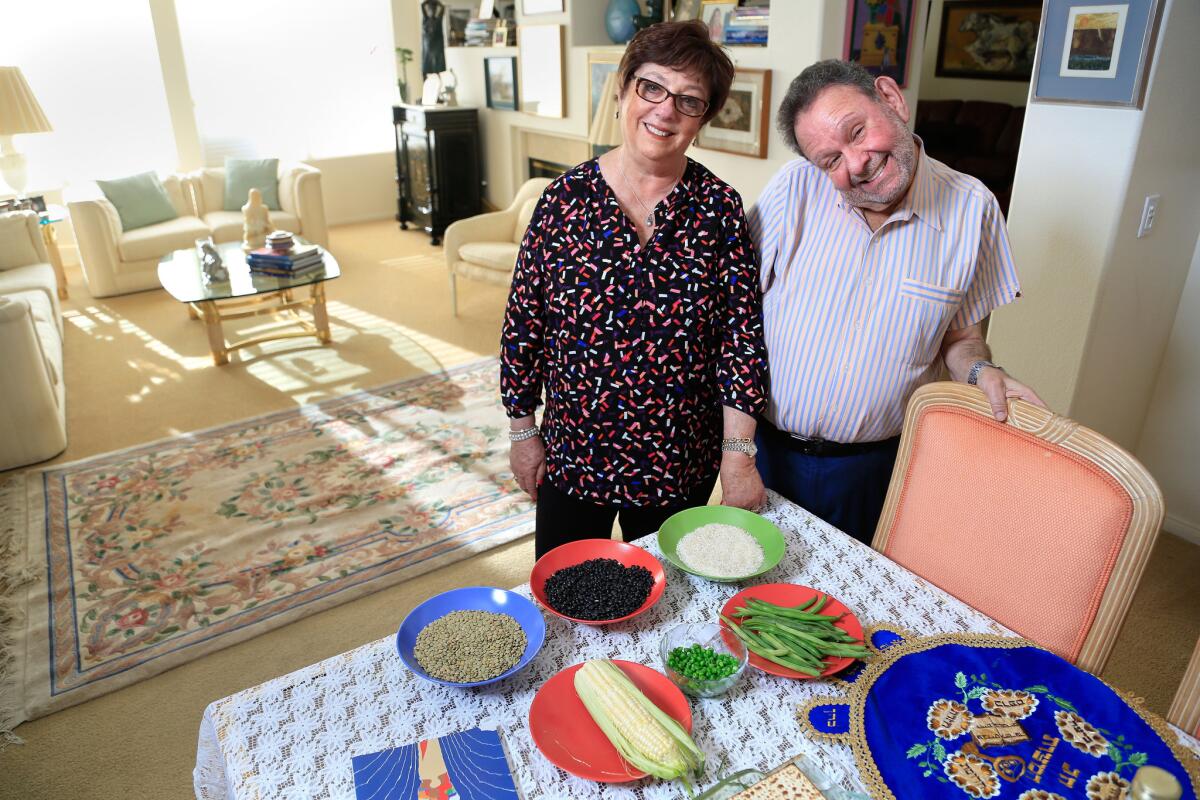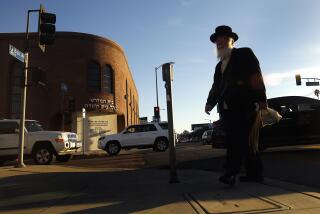Abandoning Passover tradition? Lifting the ban on some foods gets mixed reaction from Jewish families

Fanny and Ruben Rosental of Chula Vista plan on eating “kitniyot,” a category of foods that include corn, beans and rice, during their Passover celebration this year.
reporting from SAN DIEGO — When Ruben Rosental and his wife mark the start of Passover on Friday evening, they’ll abide by specific food restrictions. This year, however, they’ll have additional options for their holiday table: beans, lentils, rice and corn.
Conservative Jews of European descent have been prohibited for centuries from eating those foods during Passover. But a decision by the movement’s Committee on Jewish Law and Standards will permit Ashkenazi Jews to incorporate a category of food known in Hebrew as “kitniyot” into their Passover diets.
The shift represents a blending of cultures, in which Ashkenazi Jews have the option of eating the same foods as Sephardic Jews — descendants of those from Spain, Portugal, North Africa and the Middle East who always have incorporated kitniyot into their Passover traditions.
The ruling will affect Conservative Jews and some Reform Jews. Although Reform Judaism, which tends to be more liberal, formally allowed kitniyot in the 1800s, some people still follow traditional Ashkenazi practices during Passover. Orthodox Judaism does not base its decision-making on rulings by the Conservative movement.
A growing number of Jews in Israel have opted to eat kitniyot in recent years, but this new flexibility has sparked intense conversations. Some say the change will allow for additional, more cost-effective and healthier options. Others are reluctant to abandon long-standing family traditions.
“I’m very happy about it,” said Rosental of Chula Vista. “The cost for foods during Passover is extremely high. [This decision] will also make Passover dishes healthier.”
Rabbi Scott Meltzer, who leads the Ohr Shalom Synagogue in San Diego, said most families who have gone without eating kitniyot during Passover probably won’t change their traditions.
See more of our top stories on Facebook >>
“My family hasn’t eaten rice and corn for centuries. And I don’t have any compelling reason to change that,” he said. But, he added, “every individual Jew in the U.S. in the end decides what’s going to be their observance. American religion is an incredibly syncretic and eclectic experience.”
Passover is a weeklong festival that celebrates the Israelites’ exodus from Egypt. It is believed that upon their escape from slavery, they consumed unleavened bread because there was no time to wait for the bread to rise. Today, Jews refrain from eating leavened foods — including products made from wheat, barley, rye, oats and spelt — during Passover.
Ashkenazi rabbis banned food within the family of legumes, known as kitniyot, centuries ago because they resemble leavened food when they are cooked.
“There are a lot of people whose families are returning to [traditional] Jewish practice, who would have a strong sense of attachment to either using or not using kitniyot,” said Bill Morris, an Ashkenazi Jew who lives in San Diego.
He and his wife, Amy, plan to incorporate kitniyot into their Passover celebrations.
“There have been times in past Passovers where we have been jonesing for Mexican food,” he said.
On that front, Morris said, he plans to eat beans and tortillas.
Sanchez writes for the San Diego Union-Tribune.
ALSO
More people are filing to become citizens in the face of anti-immigration politics
As more Latino kids speak only English, parents worry about chatting with grandma
Two prosecutors left San Diego city attorney’s office after findings of 98 botched cases
More to Read
Sign up for Essential California
The most important California stories and recommendations in your inbox every morning.
You may occasionally receive promotional content from the Los Angeles Times.










